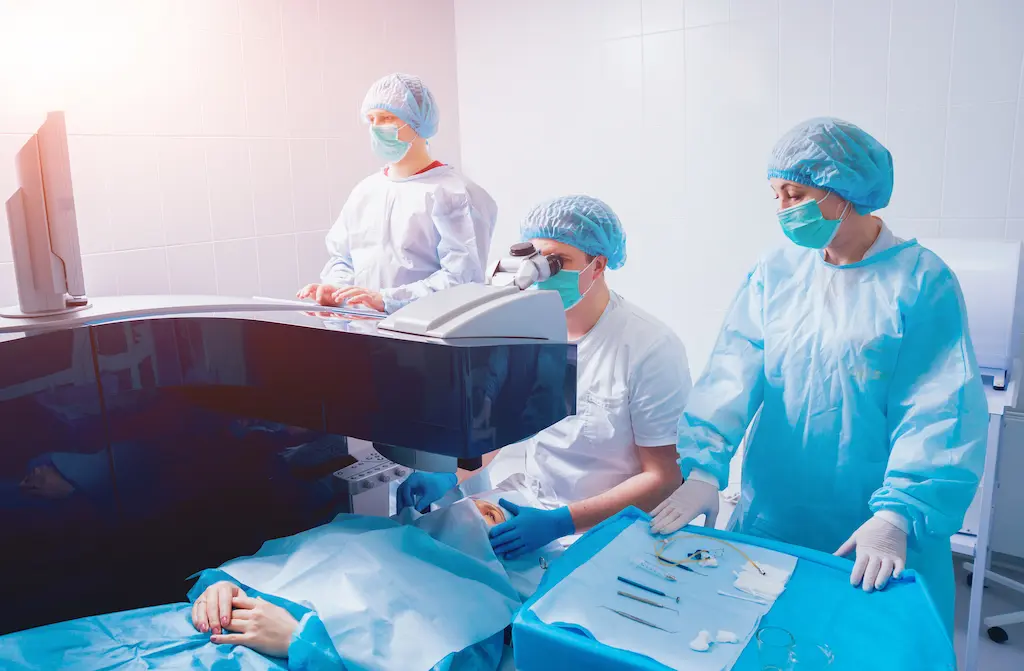
Updated: May 11, 2023

Cataract surgery in Kansas city can be a life-changing experience, offering patients the chance to improve their vision and eliminate their need for glasses or contact lenses. Although modern cataract surgery can help restore your vision to pre-cataract levels, it is not guaranteed to achieve perfect 20/20 vision.
In some cases, corrective eyewear may be necessary to get the clear vision you desire. Your eye doctor can provide options to help you reach your vision goals, such as LASIK. This blog covers what you need to know about LASIK enhancement after cataract surgery.
Yes, you can have LASIK surgery after cataract surgery. When laser cataract surgery is ready, the eye’s cloudy lens is replaced with an intraocular lens implant (IOLs cataract surgery or light adjustable lens surgery). Despite the high success rate of cataract surgery, there may still be some residual refractive error, known as a “refractive surprise,” causing impaired vision and reliance on glasses.
The patient’s prescription is sometimes embedded in the implant to prevent this. However, this is only occasionally possible due to the complexity of estimating and calculating the strength of the implant. Additionally, patients who have previously had focus vision correction surgery (LASIK), PRK, or RK surgeries, or those with corneal surface irregularities, also face this challenge.
LASIK tune-up surgery is often the most efficient way to adjust and correct refractive errors after cataract surgery.

Can LASIK be done after cataract surgery? A LASIK tune-up, which can be done several weeks after cataract surgery – is a painless procedure involving two advanced surgical tools. The first is a femtosecond laser, which creates a fine round flap in the cornea. The surgeon then folds back the flap to access the middle layers of the cornea.
An excimer laser is then used to beam ultraviolet light onto the cornea, reshaping it to focus visible light onto the retina better and improve eyesight. Once the cornea has been reshaped, the flap is put back in place, allowing the eye to heal without the need for bandages or stitches.
Several factors make a person a good candidate for LASIK. Whether you can have LASIK after cataract surgery depends on the following:
LASIK is a safe and medically accepted procedure that can help improve a person’s vision after cataract surgery. Studies have shown that people who undergo LASIK after receiving a lens implant can usually reach a refraction level of ±1.00 D. This correction level is enough to allow them to read, drive, or wear very mild lenses without any additional corrective measures.
The cost of LASIK surgery can vary greatly depending on your location, the type of procedure to be performed, and the surgeon performing the procedure. Generally speaking, the average cost of LASIK surgery ranges from $1,800 to $3,700 per eye.

There are a few alternatives for laser correction after cataract surgery:
Photorefractive keratectomy (PRK): This procedure involves removing the epithelium of the eye to get to the cornea underneath, as opposed to LASIK, which involves creating a flap for a similar purpose.
PRK often represents a viable option even for patients who aren’t eligible for LASIK. The overall resulting visual acuity level is comparable to the results from LASIK. If you are a candidate for both LASIK and PRK, your doctor will assess your eyes and vision goals and recommend the best option for your situation.
IOL exchange: IOL surgery, or intraocular lens surgery, is a type of refractive cataract surgery involving replacing the eye’s natural lens with an artificial one. During the procedure, the eye’s natural lens is removed and replaced with a new lens, known as an intraocular lens (IOL). This surgery treats cataracts and corrects vision issues caused by age-related conditions such as presbyopia.
Certain specialized types of IOLs offer unique vision correction benefits, like Toric IOL surgery. Depending on your personal needs, your surgeon will recommend an IOL to provide you with the best possible results. Surgeons can also add an intraocular lens (IOL) to the eye instead of replacing the one already inserted during the initial cataract surgery, a practice known as “piggybacking”.
LASIK is a safe, non-invasive, and precise procedure for correcting refractive errors following cataract surgery. Are you considering corrective vision surgery and curious about the LASIK and other laser surgery available at our practice?
At Discover Visions Centers, we take pride in offering the best care to all our patients. Everyone’s vision correction journey is special and our team is here to give you the personalized attention you need.
To get the most tailored advice and determine which procedure best suits you, we recommend booking a consultation with one of our consultant cataract specialists in Kansas City.